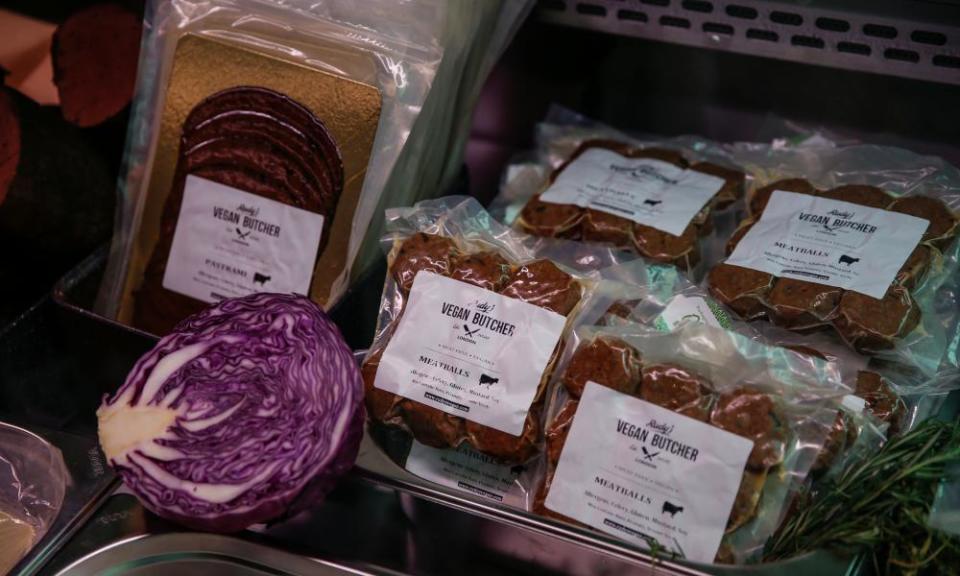Fakin’ the bacon: shoppers flock to try new vegan butchers

Ritchie Stainsby has spent most of the past week in the kitchen making as much vegan meat as possible to satisfy the hordes of customers who have flocked to the vegan butcher he opened earlier this month.
Faux, in Nottingham, has already seen hour-long queues of customers outside its premises and has been struggling to keep up with demand. It has sold out every day last week.
“It’s blown us away,” said Stainsby, Faux’s director and chef, of his first few days of trading. “We couldn’t tackle the demand – it was amazing. We’re used to cooking for big scale, but this was bordering on factory production. It was very intense.”
Watch: Everyday snacks you didn't know were vegan
Faux, based in Sherwood, north of Nottingham city centre, is the second permanent vegan butcher to have opened in the UK in the last six months. On offer is a range of 12 to 15 products, including plant-based alternatives to bacon, brisket, chicken thighs, pork belly, meatballs and more.
Everything is made by Stainsby and a small team of chefs who use flour, pea proteins, soy proteins, raw vegetables, tapioca, potato starches and grains as some of the core ingredients. Faux follows Rudy’s Vegan Butcher, which started business in Islington, London, in November last year. Like Faux, it was started by a team behind an existing vegan restaurant who make their own products. Rudy’s specialises in vegan versions of American diner food.

They, too, have experienced high demand. “We are so overwhelmed at how people have responded to our vegan meat,” said its operations manager, Max Patel. “We had a sell-out launch day and, since then, we have been selling out online and in store constantly.”
Asda, meanwhile, is trialling a supermarket vegan butcher counter – Veelicious – for six months in its Watford store. It opened in January, to coincide with Veganuary, and sells “facon”, bean burgers and meat-free meatballs, as well as jackfruit wings and mock lamb. The supermarket said the vegan butcher counter was launched in response to an increase in online searches for “vegan” on Asda’s website of 175% year on year. It has also added 22 new meat-free alternatives to its Plant Based range.
Francine Jordan, PR officer for the Vegan Society, thinks this is the start of a new trend of vegan butchers appearing on high streets across the UK. She said: “I think we’re going to see more and more of these popping up … I think this will be the next thing.”
She added: “The vegan butchers offer something that wasn’t there before. You can buy frozen vegan burgers and hotdogs but there wasn’t an element of going into a shop like a butcher’s and picking out what you wanted to eat that night for dinner.”
The early success of Rudy’s and Faux during a pandemic suggests demand exists and is growing. A report by the Smart Protein Project stated that the sales value of plant-based meat in the UK increased 63% between 2018 and 2020.
Sign-ups for the Veganuary campaign – where people eat vegan for the month of January – hit record highs in 2021, with nearly 600,000 people taking part. By comparison, there were 400,000 participants in 2020. And the number of vegans in Britain quadrupled between 2014 and 2019, according to surveys carried out by Ipsos Mori and commissioned by the Vegan Society. In 2019, there were 600,000 vegans, or 1.16% of the population. That number is expected to grow, said Jordan.
It’s not just vegans who are buying plant-based products, however. Back at Faux in Nottingham, Stainsby believes a proportion of his customers are meat-eaters wanting to try something different, or reduce their meat and dairy intake for environmental or health reasons. A survey conducted by the Vegan Society last year found that one in five Brits cut down on meat consumption during the pandemic.
Along the same street in Sherwood, Johnny Pusztai, who runs the Snobby Butcher, which won an Observer Food Monthly Award in 2011, has noticed the long queues outside Faux.
He is a bit puzzled by the concept of a vegan butcher. “I think everyone has a right to be somewhere, so it’s not for me to judge what they’re doing. However, why would you call them vegan butchers?” he asked. “At the end of the day, they’re doing vegetables … I don’t know where the butchering term comes into it.”
He said his customers have “been tickled by it” but that he admired and appreciated a new business that might bring more customers to the area. “They’ve obviously connected into a niche market, which is definitely growing. Saying that, we’ve never been so busy,” he said.
Not all feedback has been positive. Stainsby said: “We’ve had the usual trolls online saying, “Are you a greengrocers, is it just going to be a load of fresh fruit and veg?” We try and ignore that as much as we can. It does get you down when you’ve put a vast amount of time and money and effort into a new product.
“It is strange for people, it’s alien. I do understand it.”
But no one thinks negative perceptions are going to stop a possible tide of vegan butchers in future. Rudy’s has plans to expand, as does Stainsby who thinks more vegan butchers will appear. “If you look at it on a commercial level,” he said, “there’s an enormous demand. Based on that notion alone, I believe more and more will pop up.”

 Yahoo Movies
Yahoo Movies 
